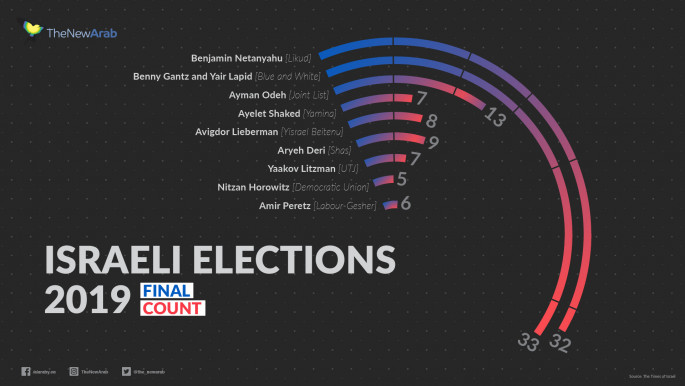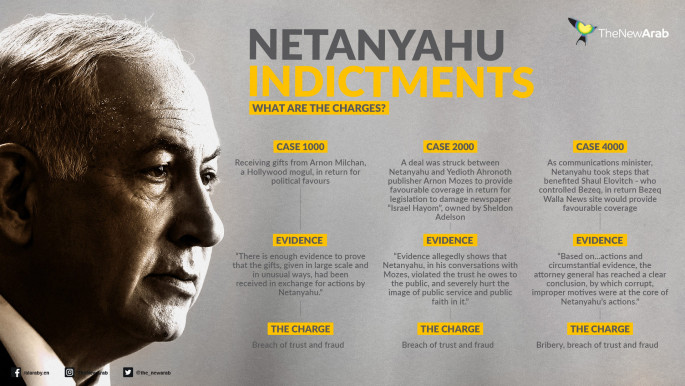Israelis to vote in March for an unprecedented third time in 12 months
The move prolongs a year-long political stalemate that has paralyzed the government and undermined public trust in the government. The country now enters what once again is sure to be a bitter three-month political campaign that is expected to deliver very similar results to elections run in April and September this year.
"Keep your children away from the television," said Yair Lapid, a leader of the opposition Blue and White party, saying the campaign will be a "festival of hate, violence and disgust".
"What used to be a celebration of democracy has become a moment of shame for this building," he added. "There are only three reasons for this election — bribery, fraud and breach of trust," he said, referring to the criminal charges filed against Netanyahu last month.
Following the September vote, Netanyahu's Likud party and the rival Blue and White, led by former military commander Benny Gantz, both failed to cobble together a governing coalition. Then, during a final three-week window that ended Wednesday, they were unable to agree on a power-sharing agreement or find an alternative leader.
Both men had insisted they want to avoid another costly election campaign. And together, their parties control a solid majority in the 120-seat Knesset.
But neither was willing to compromise on their core demands for a unity government. Netanyahu insisted on renewing his tensure as prime minister, where he is best positioned to fight his corruption charges. Gantz has refused to serve under a prime minister with such serious legal problems and called on Likud to choose a different leader.
Hours before the deadline, parliament took an initial step to dissolve itself on its own. But as speeches and committee work stretched into the night, the lawmakers managed to pass only one of three required readings of the bill on time by a 91-0 margin.
Even after the deadline automatically dissolved parliament, lawmakers worked throughout the night to finalize the March 2 election date to avoid heading to the polls on March 10, which coincides with the 2020 celebration of the Jewish holiday Purim.
Given the divisions in Israeli society, and the deep mistrust between the opposing camps, there appears to be little hope that another vote will break the loop of elections and instability that has rocked the country for the past year.
 |
| [Click to enlarge] |
The recent campaigns have been characterized by mudslinging and accusations that Netanyahu has incited against the country's Palestinian minority.
The veteran premier has also leveraged promises to annex illegal settlements in the West Bank, as well as the Jordan Valley, which constitutes around a third of the occupied Palestinian territory.
Netanyahu did not participate in the late-night parliamentary debate. But in a video on social media, he accused Gantz of courting Arab "terror supporters" and forcing new elections.
"In order to prevent this happening again, there is only one thing we must do: win and win big," he said.
The upcoming campaign is expected to cost the economy hundreds of millions of dollars and continue the paralysis until the middle of next year. With limited authority, a string of caretaker governments over the past year have frozen major legislation, key appointments, long-term planning and budgets for the military and important government ministries.
But for Netanyahu, the country's longest-ever serving leader, a new campaign offers a much-needed lifeline.
Netanyahu is desperately clinging to power to wage his legal battle from the favorable perch of prime minister. Israeli law does not require a sitting prime minister to resign if charged with a crime.
 |
Netanyahu can now use his office in the coming months as a bully pulpit to continue his attacks on prosecutors and police investigators, whom he has accused of staging an "attempted coup" against him.
Without a functioning parliament in place, Netanyahu can also put on hold his expected request for immunity from prosecution.
The outgoing parliament did not have a majority in favor of granting him immunity. Netanyahu can now hope that the next election delivers him a more favorable result.
Netanyahu's trial is on hold until the immunity issue is resolved, a process that is expected to take months.
After the March election, he also could use coalition negotiations as leverage to push potential partners to support his immunity request.
Yohanan Plesner, president of the Israel Democracy Institute, a nonpartisan think tank, said that being in the prime minister's post during these negotiations is a huge advantage. "Because then one can trade politically important Cabinet portfolios and so on in return for support for the immunity," he said.
Netanyahu's first immediate challenge will be to fend off an insurrection inside Likud. The party announced Wednesday that it will hold a leadership primary later in December.
One renegade lawmaker, Gideon Saar, has already said he will challenge Netanyahu, though the prime minister remains popular in the party and appears to have a solid edge.
Netanyahu could also face new legal questions. Although he is currently not required to step down, Israeli law is unclear about whether he could be given the authority to form a new government after the next election. Attorney General Avichai Mandelblit, who was criticized for his slow decision making before he indicted Netanyahu, will now have to rule on that question as well.
Even if Netanyahu overcomes these challenges, polls indicate that he will not be able to muster a majority in favor of granting him immunity or forming a coalition government.
Maverick politician Avigdor Lieberman, a former Netanyahu ally, has turned into the prime minister's greatest nemesis.
Lieberman served in a string of Netanyahu governments, but then abruptly resigned as defense minister last December to protest what he thought were weak policies toward militants in the besieged Gaza Strip.
That resignation pushed the country into its current predicament, setting the stage for inconclusive elections in April and then in September.
Refusing to endorse either Netanyahu or Gantz, Lieberman has repeatedly called on them to form a broad secular unity government. But with all three leaders refusing to bend, a new election may not be able to break the deadlock.
Lieberman said the two big parties were responsible for what he called "unnecessary" elections. "Neither Likud nor Blue and White wanted a unity government," he said.



